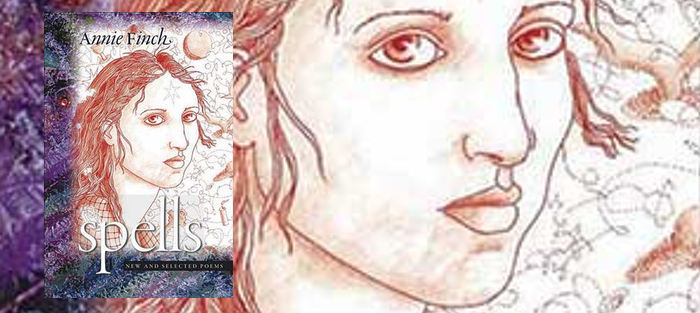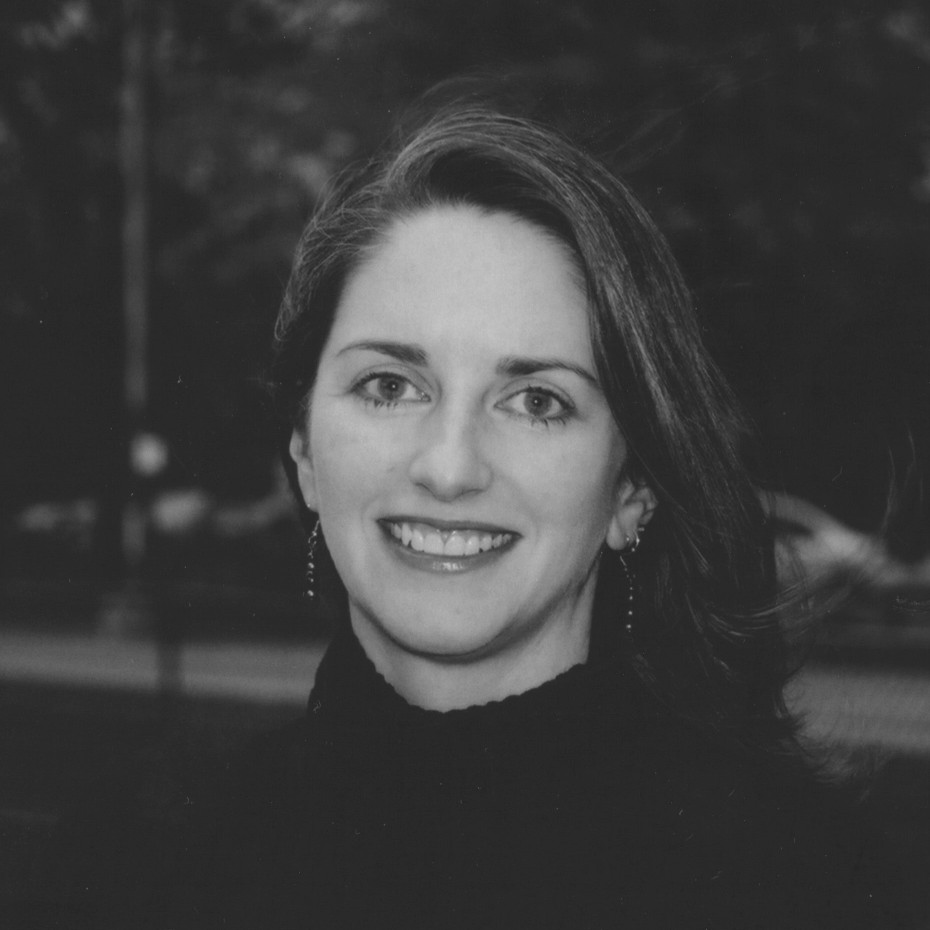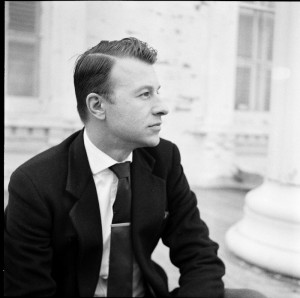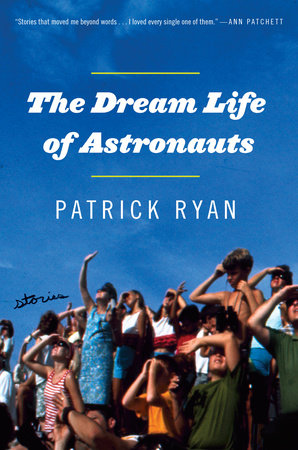Annie Finch’s latest poetry collection offers not only an opportunity to consider this poet’s long career, but also to consider two distinct hot-button issues in poetry: Is there such a thing as women’s poetry, and should there be? Does the seemingly heightened expectation for cohesiveness or a unified style undermine experimentation and variety across not only a book but a career? These two issues, of course, are not confined to poetry and are as pressing in discussions of fiction, whether it be the so-called domestic novel and chic lit or the linked story collection and author branding.
In the preface to Spells (Wesleyan Poetry Series), her new and selected collection, Annie Finch writes that her poems are “incantations to strengthen our connections to each other, to the passage of time, and to sacred cycles of nature.” Indeed, that describes how I have read Finch’s work over decades. A spell is a story, a fable, and to spell out is to explain by breaking something into parts. Likewise, an incantation is the singing of spells, drawing the listener into the story of ourselves and of the world around us. In the title poem, Finch writes:
When I had asked
Whom I had guessed,
She sent my asking out.
Now over and over
she sends it back.
Over and over it answers me.
These stanzas are quintessentially Annie Finch, with their rhythm and repetition and with their focus on reciprocity among individuals and community among women.
The opening poem of Spells, “Blessing on the Poets,” serves as an invitation. There, she acknowledges the variety in the poetic tradition, whether we are a “[p]atient earth-digger” or an “impatient fire-maker,” whether we share or save or muse or ache. She also acknowledges the variety in the threads of her own body of work, as she sometimes writes in sonnets and is sometimes, as in some of the Lost Poems, playful with language, though not fully avant-garde.
Spells is organized with sections in reverse chronological order, beginning with new poems and moving back decade by decade to 1970, with additional sections of performance work and translations. Only loosely does this represent her previous books, and one must look to the acknowledgments in the back of Spells to discern exactly which poems are from which books. In other words, Finch has reorganized her oeuvre under this concept of spells and of moving back in time, step by step, to re-explore the stylistic and thematic threads of her career.
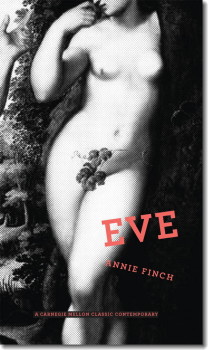 As a reader, I have been most fond of Finch’s book Eve, which first appeared in 1997 from Story Line Press and which was reissued by Carnegie Mellon Press in 2010. Numerous poems from that collection, including poems about historical-mythical women like “Eve,” “Aphrodite,” and “Brigid,” are included in Spells. Interestingly, some of these Eve poems appear in the section that represents writing done in the 1970s, when I was growing up in Illinois, where the Equal Rights Amendment failed to pass the legislature in 1972, even though a very similar equal rights clause was part of the state constitution, and despite the dozen women who chained themselves together in the state’s Capitol. As a reader, I am rarely aware of the time that elapses between the poet’s writing and my reading of a particular poem. That knowledge informed my relationship to these poems and heightened my sense of the collection as representative of a career over time. One of my favorites from this era is “Still Life,” a sonnet that brings to life a woman from a Vermeer painting. The reader glimpses a moment of her life in its rich detail, and the reader hears Finch’s sense of line: “She will stop to hold this moment near, / and drop the pitcher, and betray Vermeer.” Finch uses the poetic line to dole out the detail and establish the voice and musicality in her poems.
As a reader, I have been most fond of Finch’s book Eve, which first appeared in 1997 from Story Line Press and which was reissued by Carnegie Mellon Press in 2010. Numerous poems from that collection, including poems about historical-mythical women like “Eve,” “Aphrodite,” and “Brigid,” are included in Spells. Interestingly, some of these Eve poems appear in the section that represents writing done in the 1970s, when I was growing up in Illinois, where the Equal Rights Amendment failed to pass the legislature in 1972, even though a very similar equal rights clause was part of the state constitution, and despite the dozen women who chained themselves together in the state’s Capitol. As a reader, I am rarely aware of the time that elapses between the poet’s writing and my reading of a particular poem. That knowledge informed my relationship to these poems and heightened my sense of the collection as representative of a career over time. One of my favorites from this era is “Still Life,” a sonnet that brings to life a woman from a Vermeer painting. The reader glimpses a moment of her life in its rich detail, and the reader hears Finch’s sense of line: “She will stop to hold this moment near, / and drop the pitcher, and betray Vermeer.” Finch uses the poetic line to dole out the detail and establish the voice and musicality in her poems.
“Lucid Waking,” also previously published in Eve, demonstrates the expansiveness of many of Finch’s poems. “Once I wanted the whole dawn not to let me”—the poem opens wide with that first line. And then it moves lively wordplay: “[…] One morning, then, I awoke and watched as / waking woke me, came slipping up through half-light[.]” The dawn, the waking, moves on cat feet “to crouch, to call, to answer.” This simple poem embodies that moment of the body’s stretch from sleep into day and also is emblematic of Finch’s style and the coherence of this book around several themes, including the body.
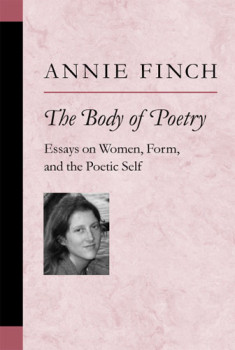 The bodies in the poems of Spells are often women’s bodies, and Finch asserts in the preface, “I am proud to define myself as a woman poet.” I’ve written about this term—women’s poetry—before, and Finch has declared the importance of this concept in an essay called “Confessions of a Postmodern Poetess.” She sees the term poetess as empowering, in that it offers an alternative to “a single and unified lyric self who defines an identity by opposing and appropriating the world.” The poetess, as Finch sees her, is a different I than the Romantic tradition has promulgated. She argues that the poetess tradition, though often criticized for sentimentalism, harbors untapped power even today. Indeed, to use these terms recognizes that women have been and continue to be part of the poetic tradition that often seems to erase them.
The bodies in the poems of Spells are often women’s bodies, and Finch asserts in the preface, “I am proud to define myself as a woman poet.” I’ve written about this term—women’s poetry—before, and Finch has declared the importance of this concept in an essay called “Confessions of a Postmodern Poetess.” She sees the term poetess as empowering, in that it offers an alternative to “a single and unified lyric self who defines an identity by opposing and appropriating the world.” The poetess, as Finch sees her, is a different I than the Romantic tradition has promulgated. She argues that the poetess tradition, though often criticized for sentimentalism, harbors untapped power even today. Indeed, to use these terms recognizes that women have been and continue to be part of the poetic tradition that often seems to erase them.
To see this erasure, we need look no further these days than the VIDA count, which “manually, painstakingly tall[ies] the gender disparity in major literary publications and book reviews.” By counting the percentages of female and male authors whose work appears in publications like Granta and Harper’s—by labeling work according to the author’s gender—VIDA makes an uneven playing field visible to all. In addition, VIDA pushes beyond the surface-level explanations for gender disparity in major literary venues, including that the publication ratio represents the submission ratio, and points to editorial policies that shape reading and evaluation, social phenomena like masculine overconfidence, and hidden assumptions about who writes about what and what’s worth writing about.
Even if Annie Finch’s Spells were read without the author being identified, a reader is likely to read it, at least subconsciously but probably overtly, as women’s writing. The poems in this collection encourage gendered reading or encourage gender as part of reading. Maybe that’s a problem.
The argument against terms like poetess and women’s poetry, of course, is that they essentialize and, inadvertently, relegate poetry written by women to other and lesser. In an attempt to illuminate, the terms can diminish good writing by women. In the January 2006 issue of Poetry, three poets, who happen to be women, wrote a call to abolish the term women’s poetry. Two years later, in an article in Legacy, I restated part of their point myself: “Why, after all, should women writers worry that their work may be judged in relation to their womanness? Why should they be obligated to fit or resist gendered expectations?”
Early in that Poetry exchange, J. Allyn Rosser posits several definitions of the term, along with the inadequacies of each, and I summarized them in my Legacy article:
1 ) “Poetry written by women,” a definition that implies it is lesser; 2 ) “Feminist poetry,” which “is expected to address the marginalized and oppressed position of women in our historical, sociological, and literary cultures, present and past, and to advocate change. But then we already have a term for that: feminist poetry”; 3 ) Poetry written for an audience of women, which, she argues, is about “marketing” and apology, not aesthetics; 4 ) “Poetry in a distinctly women’s style/voice,” which is inaccurately essentialist; and 5 ) “Poetry about women’s issues” or experiences, which she finds derogatory because every poem is written through the individual poet’s lens to explore “the mysteries and complexities of the human condition.”
This list makes great sense. The poetic imagination transcends—or should transcend or should be allowed to transcend—social restrictions. A poet’s gender does not—or should not—limit subject matter, theme, or style. To re-segregate is to reinforce assumptions about gender and make it more difficult to change or demolish them.
I remain in a quandary about these labels and categories. Depending on how it’s framed, the term and concept are a problem or a solution, a terrible conundrum. In that article, published in 2008, I implied that we all benefit from not settling the question: “To debate the term women’s poetry is to keep categories in flux, to question a hierarchy implied by categorization, and to distinguish description from prescription.” Annie Finch’s Spells, a sweeping new and selected book, pushes readers to consider and even embrace the tradition of women’s poetry. It is no conundrum for her.
Spells is able to do this, in part, because of its cohesiveness. This collection, despite or perhaps even because of its variety and length, feels connected. At more than 200 pages, it remains of a piece because the poems are in conversation with each other even across decades. “Homebirth” begins,
Home is a birthplace since you came to me,
pouring yourself down through me like a soul,
calling the cosmos imperiously
into me so it could reach to unroll […]
The next poem, “Abortion Spell,” ends, “Hands born of woman will not stop this flood, / this generous, selfish, long-opening gift.” Both these poems are new, appearing toward the beginning of the collection. The reader sees that Finch is attentive to sound, line breaks, the well-placed adverb and adjectives as well as to stereotypically feminine subject matter.
These poems also echo back to a poem like “Harvest Seam,” which appears in the section “From the Lost Poems,” those poems Finch had trouble placing because they were more experimental before experimental was mainstream. “Harvest Seam” ends with the lines “Still, like a midnight, I was not appalled. / I took the hands, and harvested, and fall, / a harvest, kept its nothing from my fall.” Nature and the body intertwine, form meaning, find the Finch line—whether the poem was written in the 1980s (like this poem, “Goddess,” “Strangers,” “The Door,” or “No Snake”) or in the last decade or so.
In this way, the accumulation in Spells offers a more unified self than readers might expect of a contemporary poet’s career. Finch resists the Romantic unified self not by critiquing its coherence but by embracing a single and unified lyric self who defines an identity by communing with and appreciating the world. It’s possible that poems that worked against the coherence in Spells were not selected for inclusion, that the poet’s career is more wild than evident in Spells, that the unified lyric self here is gleaned and made.
Such cohesiveness, especially in a new and selected, is incredibly rewarding. The work as a whole has depth, tightness, confidence in itself. The reader can trust Spells, poem after poem, and can revel in it. There seems no harm and great value in selecting toward a center, a style, a theme. I enjoyed the reading experience thoroughly, knowing I could settle in.
In a 2003 essay called “The Winnowing of Wildness,” however, poet Beth Ann Fennelly cautions against the pressures that emerging poets are under to present a cohesive manuscript. Looking at the work in Spells, one might wonder whether Finch defined herself narrowly from the start and closed herself off to possibilities, whether she winnowed and, therefore, impoverished her work in the long run. Fennelly suggests, “poets should consider how long they are given before they’re expected to manifest a unified style.” Fennelly attributes the increase in this pressure toward “a stylistically unified book” to the rise of first-book contests.
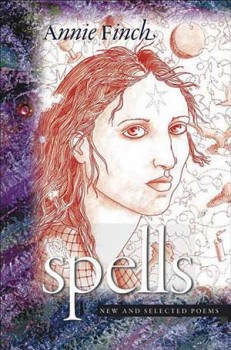 I’d argue that it’s also related to the rise of branding for authors more generally. While I’m leery of the rise of author branding for many reasons, including its valuing of exposure over money (e.g., free content like this review) and its circular logic that what you write points to your brand and your brand points to what you write, our work forms the ways we are known and want to be known. (This review defines my public persona.) Coming to know who you are as a poet is a good thing that can deepen both your experience and the reader’s experience.
I’d argue that it’s also related to the rise of branding for authors more generally. While I’m leery of the rise of author branding for many reasons, including its valuing of exposure over money (e.g., free content like this review) and its circular logic that what you write points to your brand and your brand points to what you write, our work forms the ways we are known and want to be known. (This review defines my public persona.) Coming to know who you are as a poet is a good thing that can deepen both your experience and the reader’s experience.
It’s rather like auteur theory for film, and that seems a better way to talk about poetry than does branding. According to this view, every film a director makes reflects that individual’s vision (though, of course, a film also depends on a screenwriter, actors, and a large crew). This way of reading works especially well for certain directors, like Alfred Hitchcock or Stanley Kubrick, whereas other directors and screenwriters play with the medium more wildly and are more difficult to pin down.
Finch entered the poetry world before the rise of first-book contests and undoubtedly without realizing that she might be creating her brand as an author. Either the winnowing of wildness was already part of the process of emerging as a poet or she gravitated toward certain subject matter and stylistic concerns that have sustained her work for decades. So, auteur theory works well in considering Spells.
Moreover, over the course of Finch’s career, the cohesiveness across poems and collections allows the reader to recognize the variations and experimentations and to see those departures as meaningful. Through the connectedness that her creative vision provides, the reader can see that Finch does not write the same thing over and over again. The reader never feels that one of these things just doesn’t belong, for what doesn’t belong is not among these poems.
The book ends with “A Fragment of Sappho”: “It is not appropriate, in a household / Given to the Muses. Those lamentations / Do not belong here.” Spells is a house given to the Muses. What belongs in Annie Finch’s Spells is more than one might expect. Together, the poems are fables and stories that echo into something greater, drawing the reader into a grand, female-centered narrative of ourselves and the world.

